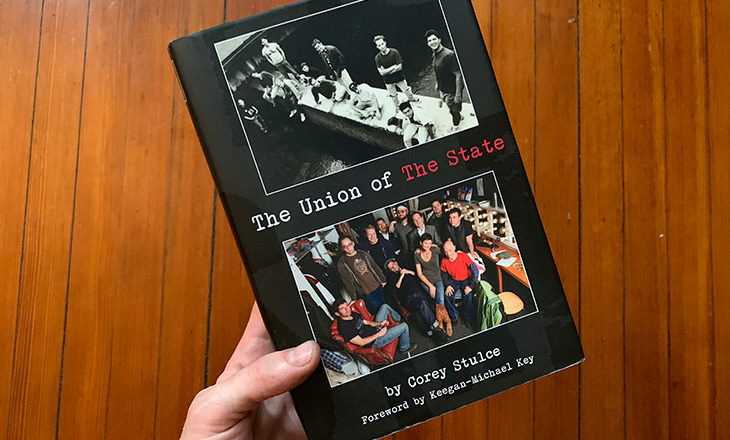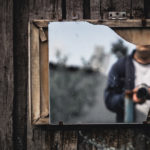I finally finished the oral history of the sketch comedy group The State. I think it came out two or three years ago but it sat on my shelf because I wasn’t sure that I was ready to read something so exhaustive. It’s close to six hundred pages and it’s about a sketch group that had four six-episode seasons on MTV (and one special on CBS) in the early nineties.
I’m downplaying this for you, the reader who might not be obsessed with The State (if that’s you, I feel sorry for you), because I loved every damn page of this book. After all, four seasons of six episodes apiece is the stuff that classics are made of in England.
I’ve spoken before about my love for The State. (You can read about it here, along with my love of the movie So I Married an Axe Murderer.) It came along in my life at the exact right time. I was sixteen or seventeen years old, a comedy nerd, and a little sick of SNL. The State just felt like it was for me and anyone who liked it got me.
I’ve read about music subcultures, like punks at CBGBs in the seventies, the hardcore kids in DC in the early eighties with shaved heads and Doc Martens, the Hacienda in Manchester. Whenever people talk about those scenes, half of the appeal is the fact that they were there to experience it.
Being a fan of The State is the closest that I’ll get to that. Perhaps it’s hyperbole comparing watching a sketch comedy show to being at seminal venues of rock history but I’m a dork, just let me have it.
It’s hard to tell if someone who isn’t a huge fan would like this book because it starts at the very beginning and I mean the very beginning of The State: the first day of freshman year at NYU where they all met.
I was hooked, though. I loved hearing about the previous NYU sketch group The Sterile Yak and how Todd Holoubek broke off to form something called The New Group that eventually became The State. It started with a democratic, ensemble first ideal, that everyone was an equal member.
That isn’t to say that everyone who wanted to be in it stayed in it. One of my favorite pieces of trivia from the book is that it was Michael Ian Black’s job to take people aside and tell them that it wasn’t working out with the group. Eventually they formed a solid 11-person ensemble that ended up on MTV working on the Jon Stewart hosted You Wrote It, You Watch It (a show they all hated but I loved) and eventually landing their own self-titled sketch show.
They were punk rock assholes, to their bosses and each other, though they only seem to regret that behavior towards the former. There’s a lot of apology towards MTV and their producers. They didn’t realize how fortunate they were to have this show at all.
As for their behavior towards each other, there are lots of instances of resentments that never really went away. Garant stole the idea for “Tenement” from Marino. Jann resented Wain’s “Editing” sketch. Lennon said “Hey, Cindy Crawford!” while Holoubek was pouring his heart out to the group (ironically Lennon remembered it, Holoubek didn’t).
The book has breakdowns of sketches from every single episode, which was a dream for me, to know who wrote what and what they thought about it. Again, unless you’re a State obsessive, I’m not sure how much you’re going to care about the history of “Taco Man” or “Cutlery Barn” and how Tom Lennon saved the sketch by changing “fried poop” to “fried bumblebees” (and he was right too, I don’t care what Showalter thinks).
The beginning of the end of the group came when they strayed from their original mission: to be an ensemble of equals. The State wanted to grow and move beyond MTV, a decision they either all regret or question. They moved to CBS to do a series of specials, where the success of each would beget another one, hopefully leading to a series to compete with SNL.
The very first special was The States’s 43rd Annual Halloween Special and it was the beginning of the end. Holoubek, the founder of The New Group, left the group and the now 10-member State relegated certain members to lower status as writers. They made Ben Garant head writer and, on at least one occasion, the group rebelled against him pretty passionately. In the book he sounds like he’s not over it.
The special was a failure and an article in Esquire about the creation of the show by David Lipsky (author of Although of Course You End Up Becoming Yourself, portrayed by Jesse Eisenberg in the movie The End of the Tour) got a CBS executive fired for racist comments.
Suffice it to say, that experience is one of the many reasons The State never made the jump to the mainstream.
On a personal note, I love that special. I tracked down quicktime clips of the sketches in the early oughts and then they disappeared. I never saw it because it aired while I was a freshman in college and I was probably too busy drinking Milwaukee’s Best and because CBS didn’t promote it.
But here it is:
The boiler and the police station sketch are still favorites of mine. And the dwarf in the opening number is, in fact, Peter Dinklage.
Then there was a book. There was an album. Nobody cared. They all moved on. Viva Variety, Reno 911!, Wet Hot American Summer, RISK! plus a million other projects.
It’s kind of a classic story of early success, even if that success is artistic and not commercial. They all thought their experience as a group would be what all showbiz experiences are like. They found out that they were wrong. I loved that it was an oral history. You can hear that they really are like a family. They love each other but they needed the distance of miles and years not to strangle each other.




